ORGANIZATIONAL BEHAVIOR
组织行为(英语)
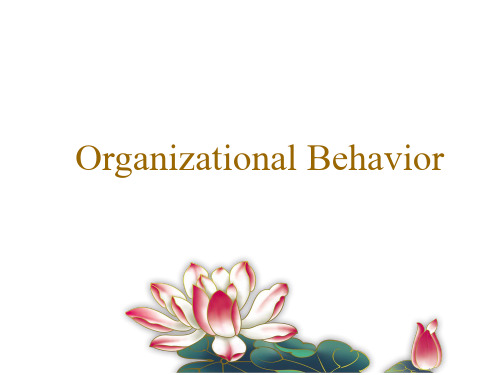
Managers do their work in an organization, which is a consciously coordinated social unit, composed of two or more people ,that functions on a relatively continuous basis to achieve a common goal or set of goals.(组织是一种人们有目的地组合起来的社
(4) Management Skills Robert Katz has identified three essential management skills: technical , human, and conceptual.(罗伯特卡茨提出了三种基本 I. II. III. Technical Skills Human Skills Conceptual Skills
Gender Nearly half of the U.S. Workforce is now women, and women are a growing percentage of the workforce in most other counties throughout the world. Organizations need to ensure that hiring and employment policies create equal access and opportunities to individuals, regardless of gender. Race The percentage of Hispanics, blacks, and Asians in the U.S. workforce continues to increase. Organizations need to ensure that polices provide equal access and opportunities, regardless of race. National Origin A growing percentage of U.S. workers are immigrants or come from homes where English is not the primary language spoken. Because employers in the United States have the right to demand that English be spoken at the workplace on jobrelated activities, communication problems can occur when employees’ Englishlanguage skills are weak.
组织行为学词汇

组织行为学(Organizational Behavior) 本部分词汇包括以下内容:1、个体心理与行为2、人际关系与群体行为3、领导行为与领导理论4、激励理论5、组织行为理论6、组织变革与发展affiliated manager关系型管理者affiliation need归属需要action research行为研究action skill行为技巧action training行为培训action learning行为教育activity analysis行为分析activity chart行为图activity learning行为教育activity teaching行为培训attainment test成就性测验attitude scales态度等级authoritarian theory权威领导理论autocratic control专利控制autonomous work group独立工作小组abnormal behavior变态行为behavior contrast行为差异behavior objective行为目标bargaining range谈判范围behaviorism行为主义behavior criterion行为标准behavior determinant关键行为behavior dynamic行为驱动力behavior extrinsic外显行为behavior field行为范围behavior genetics行为遗传学behavior intrinsic内在行为behavior method行为方法behavior molar行为束behavior object行为分子behavior overt行为目标behavior pattern公开行为behavior rating行为模式behavior repertoires行为情节behavior sampling行为抽样behavior segment行为成分behavior shaping行为塑造behavior space行为空间behavior spontaneous自然行为behavior stream行为流behavior therapy行为疗法behavior verbal语言行为behavior disorders行为紊乱collective bargaining集体谈判conformer服从者consultative management咨询型管理dissatisfeters不满意因素expectancy theory期望理论expectancy chart期望图group dynamic集体驱动力group incentive集体激励group problem-solving集体商议group decision-making集体决策Hezzberg`s theory赫茨伯格的双因素理论hygiene保健因素integrated manager整合型管理者individual psychology个体心理学individual response个体反应individual test个别测验individuality graphic笔迹个性indifferent stimulus差异性刺激ink plot test墨迹测验job spoiler破坏工作者maintenance factor保健因素Maslow`s theory of needs马斯洛需求理论motivator激励因素role conflict角色冲突role perception角色知觉satisfiers满意因素shared value共同价值观support leadship支持型领导sub-culture亚文化task-based participation工作参与Aability能力absenteeism旷工、缺勤acceptance theory of authority 权威接受论accommodating肯通融的achievement motivation成就动机achievement need成就需要achievement/power theory成就/权力理论action research行为研究affective component of an attitude态度的情感成分affiliation need亲和需要alarm stage恐慌阶段alienation离异allocative values分配价值arbitrator仲裁者assertive communication style果断的沟通风格assessment center评价中心attitude态度attitude survey态度调查attribution归因attribution theory of leadership领导的归因理论attributional bias归因偏见attributional model归因模型authority 权威、权力autocratic model专制型autonomy自主权avoiding回避Bbehavior modeling行为模型behavior modification行为校正behavioral bias行为偏差behavioral component of an attitude态度的行为成分behavior theories of leadership领导的行为理论behaviorally anchored rating scales行为定位评定量表benevolent autocrat仁慈的独裁者bias-free organization无偏见组织bias-reduction training降低偏见训练biofeedback生物反馈biographical characteristics生物特征board representatives董事会代表body language体态语言boundary roles边界角色boundary spanners跨边界者boundaryless organization无边界组织brainstorming头脑风暴法;脑力激荡bureaucracy科层结构burnout身心崩溃bystander effect旁观者效应Ccafeteria benefits自助餐式福利career职业career anchors职业定位career stage职业阶段career success职业成功centralization集权chain of command指挥链chain-reaction effect连锁反应效应change变革change agent变革代理人channel渠道channel richness渠道丰富化charisma领导魅力;领导者的超凡魅力charismatic leadership具有超凡魅力的领导者chief executive officer(CEO)首席执行官classical conditioning经典条件反射cliques小集团closed-end questions封闭式问题cluster chain群族链clusters群族coalitions联合体coercive power强制权codetermination共同决定cognitive component of an attitude态度的认知成分cognitive conflict认知冲突cognitive decision style model认知决策方式模型cognitive dissonance认知不协调;认知失调cognitive evaluation theory认知评价理论cognitive resource theory认知资源理论cognitive theories of motivation激励的认知理论cohesiveness内聚力;凝聚力collaborating合作collectivism集体主义collegial model学院模型command group指挥小组;命令群体committee委员会communication沟通communication climate沟通气氛communication loop沟通环communication media沟通媒介communication overload沟通超负荷communication process沟通过程communication networks沟通网络comparable worth比较价值competence技能complementary transaction互补的行为交易complete pay program完整的报酬方案compromising妥协conceptual skills概念分析技能conciliator调停者conflict冲突conflict management冲突管理conflict process冲突过程conflict reaction style冲突反应方式conflict resolution冲突的解决conflict stage冲突阶段conformity从众consideration体贴constraint抑制力;限制consultant as negotiator作为谈判者的顾问consultative management顾问管理content theories of motivation激励的内容理论contingency approach to O.B组织行为学的权变趋向;思路contingency model of leadership领导的权变模型contingency organizational design权变的组织设计contrast effects对比效应controlling控制cooptation合并;吞并core dimensions of jobs工作的核心纬度core values核心价值观corrective discipline修正性惩罚cost-benefit analysis成本-收益分析cost-minimization strategy成本削减战略cost-reward comparison成本-报酬比较counseling咨询credibility gap信度差距critical incidents关键事件cross-communication交叉沟通cross-cultural communication跨文化沟通cross-function teams跨部门团队crossed transaction交叉交流cultural distance文化差异cultural diversity文化多样性cultural empathy文化移入cultural separatism文化隔离主义cultural shook文化冲击culture文化custodial m管理模型Ddecentralization分权decisions决策decoding译码;解码defensive behaviors自卫行为deferred judgement延迟的判断delegating style授权方式delegation授权dephi group德尔菲小组dephi technique德尔菲法demands需要departmentalism部门化dependency从属;依赖dependent variables因变量development level发展水平development-oriented leader以发展为导向的领导dialectic decision method辨证的决策方法dictionary technique字典式方法directive counseling指导性咨询discharge解雇;释放discipline惩罚;训导discrimination歧视distinctive competencies区别性技能distributive bargaining分配谈判distributive justice分配公平dominant culture主流文化double-loop learning双环学习downward communication下行沟通downward feedback下行反馈dual-career couples双职工夫妇driving forces推动力dysfunctional conflict功能失常性冲突Eencoding编码encounter group 交朋友小组encounter stage正视阶段enriched sociotechnical work system 丰富化的社会技术工作环境environment环境Equal Employment Opportunity(EEO)平等工作机会Equal Employment OpportunityCommission(EEOC) 平等工作机会委员会equal employment opportunity laws平等工作机会法equity sensitivity公平敏感性equity theory公平理论ERG theory ERG理论esteem needs尊重需要ethical dilemma道德困境ethical imperative道德规范ethical leadership道德领导ethnocentrism种族中心主义exchange theory交换理论exhaustion stage疲惫阶段existence needs生存需要expectancy期望expert manager期望理论expert power专家管理者external locus of control专家权力externals外控者Fface-to-face communication面对面的沟通family-friendly organizations家庭式友好组织feedback反馈feedback loop反馈环feedback-seeking behavior寻求反馈行为Fiedler contingency model费德勒权变模型filtering过滤first-order change第一层次变革fixed-interval reinforcement固定间隔强化fixed-ratio reinforcement固定比率强化formal group正式群体formal network正式网络formalization 正规化formalization stage正规化阶段forming形成four-step decision-making process四步决策过程friendship group友谊群体frustration挫折full-disclosure information systems完全开放的信息系统functional action功能性行为functional conflict功能性冲突functionally illiterate半文盲fundamental attribution error基本的归因错误Ggainshareing收益分享gainshareing plan收益分享计划garbage can model垃圾箱模型gender-biased attribution性别偏见归因genetic testing遗传测试geocentric organization全球性组织goal目标goal displacement改变目标goal setting目标设置goal-setting theory目标设置理论goals of organizational behavior组织行为的目标Good Enough Theory of Promotion晋升的足够好理论graphic rating scales图表评价量表grid OD组织发展方格图group群体group decision support system群体决策支持系统group demography群体人口统计group dynamics群体动力group order ranking群体排序groupthink群体思维growth need成长需要growth phase成长阶段Hhalo effect晕轮效应hawthorne effect霍桑效应hierarchy of needs theory需要层次理论High Involvement Organizations(HIOs)高参与组织higher-order needs高层次需要homeostasis自动平衡honesty tests诚实测验horizontal cliques水平团体horizontal conflict水平冲突horizontal distribution of authority权利的水平分配hot-stove rule热炉规则human relations人际关系human relations view of conflict冲突的人际关系观点human skills人际技能humanistic values人本主义价值观hygiene factors保健因素Iillegitimate political behavior非法的政治行为imitation strategy模拟战略implicit favorite model隐含、内隐偏好模型implicit personality theory人格理论impression management印象管理incentives刺激;诱因independent variables自变量individual differences个体差异individual ranking个体排序法individualism个人主义individualization使具个人特色;个体化industrial psychology工业心理学industrial subculture工业亚文化informal group非正式群体informal leaders非正式领导informal network非正式网络informal organization非正式组织information-based power信息权information technology信息技术innovation创新;革新institutional power制度化权利institutional team制度化团队institutionalization制度化instrumental values工具性价值观integrative bargaining综合谈判Integrative Decision Method(IDM) 综合决策法integrity正直intellectual ability智能interaction相互作用interacting groups相互作用群体interactionist view of conflict冲突的相互作用观点interest group利益群体intergroup conflict群体间冲突intergroup development群体间发展intermittent reinforcement间断强化internal locus of control内部控制点internals内控者interorganizational conflict组织间冲突interpersonal conflict个人间冲突intersender role conflict发送者之间的角色冲突intragroup conflict群体内冲突intramanagement communication管理集团内沟通intraorganizational conflict组织内冲突intrapersonal conflict个人内部冲突intuitive decision making直觉决策isolates离异者Llabor union工会laboratory training实验室培训laissez-faire leadership放任自流的领导latent conflict潜在冲突lateral communication横向沟通law of diminishing returns边际效益递减规律law of effect效果律Leadership Effectiveness AndDescription(LEAD)领导有效性与说明Leader-Member exchange(LME) theory领导-员工交流理论leader-member relations领导-员工关系leader-participation model领导参与模型leader-position power领导的职位权力leadership领导leadership style领导方式leading领导learning学习learning organization学习组织learning theory学习理论Least-Preferred Co-worker(LPC) questionnaire最难共事者问卷legitimate political合法的政治行为legitimate power合法权利leniency error宽松错误leveling effect水平效应liaisons联络者linking pin连接点locus of control控制点loose rate标准宽松lower-order needs低层次需要MMachiavellianism马基雅维里主义Management By Objectives(MBO)目标管理Management By Walking Around(MBWA)走动式管理managerial grid管理方格图managerial philosophies管理哲学managers管理者;经理manifest conflict显性冲突matrix organization矩阵组织matrix structure矩阵结构Meclelland`s theory of needs麦克利兰的需求理论mechanistic model机械模型mechanistic organizations机械组织meditation调停mediator调停者mentor指导者message信息metamorphosis stage质变阶段middle management communication中层管理委员会models of organizational behavior组织行为模型morale士气;精神Motivating Potential Score(MPS)激励的潜在分数motivation激励;动机motivation-hygiene theory激励-保健理论Motivation/Results(M/R) model激励/成果模型motivational factors激励因素motivational patterns激励类型multinational corporations跨文化管理矩阵multiple choice多项选择multiple management多层管理multiprofessional employees多专业员工mutual interest互利Nnatural work team自然工作组need需要needs theories需求理论negative leadership消极领导negative performance attribution消极绩效归因negative reinforcement负强化neglect忽视;疏忽negotiation谈判;协商network网络neurotic organization机能不健全组织neurotic personalities不健全人格nominal group名义群体Nominal Group Technique(NGT)名义群体法nondirective counseling非指导性咨询nonverbal communication非言语沟通norm常规;规范;定额;平均数norming规范化norms of reciprocity交流规则objective career success客观的职业成功ombudsperson信息搜集员one-way communication单向沟通open-end questions开放式问题open self开放的自我open system开放系统openness开放operant conditioning操作性条件反射optimizing model最优化模型organic organizations有机组织organization组织organizational environment model组织/环境模型Organizational Behavior(OB)组织行为Organizational Behavior Modification(OB Mod)组织行为校正organization-based influence组织影响力organizational culture组织文化organizational citizens组织公民organizational design组织设计organizational development组织发展organizational entry组织进入Organizational Fairness Questionnaire组织公平性调查问卷organizational learning curve for change组织变革的学习曲线organizational politics组织政治organizational socialization组织社会化organizational structure组织结构organizational life cycle组织生命周期organizing组织overparticipation过度参与overt behavior公开行为Ppaired comparison成对比较法paper-and-pencil tests纸笔测验participation参与participative counseling参与式咨询participative leader参与式领导者participative management参与式管理path-goal theory途径-目标理论perceived conflict可觉察的冲突perceived control可觉察的控制perception知觉perceptual biases知觉偏见perceptual error知觉错误performance appraisal绩效评估performance feedback绩效反馈performance monitoring绩效监控performance-outcome expectancies绩效-产出期望performance-satisfaction-effort loop绩效-满意-努力环performing运作personal-based influence个人影响力personal power个人权力personality个性;人格personality-job fit theory个性-工作适应论personality traits人格特质philosophy of O.B.组织行为的哲学physical ability体能physical withdrawal身体退缩piece rate计件工价piece-rate pay plans计件工资计划piecework system计件工作系统planned change有计划的变革polarization两极分化political behavior政治行为political power政治权利politics政治polygraph测谎器positive leadership积极的领导positive reinforcement正强化position power职位权力power权力power distance 权力距离power need权力需要power tactics权力策略prearrival stage提前进入阶段prejudice偏见;成见preventive discipline预防措施problem-solving teams问题解决小组procedural justice程序公正性procedure程序process consultation过程咨询process value analysis过程价值分析production-oriented leader以生产导向的领导productivity生产力profit-sharing plan利润分享计划projection投射protected group被保护群体protege被保护者psychological career success心理的职业成功psychological costs心理成本;精神成本psychological contract心理契约psychological distance心理距离psychological reactions心理反应psychological stress evaluator心理压力测量器psychological support心理支持psychological withdrawal心理退缩punishment power惩罚权Punctuated-Equilibrium model间断-平衡模型Qquality circles质量环qualify of life生活质量Qualify of Work Life(QWL)工作生活质量qualify of work performance工作绩效质量quantity of life生活数量Rrandom cliques随机团体rationality合理化reactive反应的realistic job previews实际的工作预演reference group参照群体reciprocal interdependence互惠的相互依赖reengineering再造工程;重整refreezing重新冻结referent power参照权reinforcement强化reinforcement theory强化理论reinforcement schedule强化程序relatedness need相互关系需要reliability信度research研究;调查resistance to change变革阻力restraining force抑制力retraining再培训reverse cultural shock反向的文化冲击reward power奖励权rights of privacy隐私权risky shift冒险的转变rituals惯例robotics机器人学role角色role ambiguity角色不清role conflict角色冲突role expectations角色期望role identity角色一致role models角色模型role playing角色扮演role pressure角色压力role set角色群role perceptions角色知觉role overload角色超荷Sscalar process分级过程scanlon plan史甘农计划second-order change第二层次的变革selective perception选择性知觉self-actualization自我实现self-appraisal自我评估self-censorship自我调查self-efficacy自我效能self-esteem自尊self-fulfilling prophecy自我实现预言self-leadership自我领导self-managing teams自我管理小组self-monitoring自我监控self-perception theory自我知觉理论self-serving bias利己偏见semantic barriers语义障碍semantics语义学sensitivity training敏感性训练sensor-type personality传感器型个性sequential interdependence顺序的相互依赖sexual harassment性骚扰shaping behavior行为塑造shared value共同价值观similarity error相似形错误simple structure简单结构simulations模拟single-loop learning单环学习situational leadership theory领导的情境理论skill-based pay技能工资skill variety技能多样化social comparison theory社会比较论social cues社会暗示social equilibrium社会平衡social facilitation社会促进social information-processing model社会信息加工模型social leader社会领导者social-learning theory社会学习理论social network社会网络social network analysis社会网络分析Social Readjustment Rating Scale社会再适应评估量表social responsibility社会责任social structure社会结构social support社会支持social system社会系统socialization社会化socioeconomic model of decision making决策的社会经济模型sociogram社会成员关系图sociometry社会测量学sociotechnical systems社会技术系统span of control控制幅度specification分工;规范。
组织行为学名词解释

组织行为学名词解释组织行为学(Organizational Behavior,简称OB)是研究组织中个体、群体和组织本身行为的学科。
它主要关注组织的运作方式、员工的行为以及组织内部的相互关系和相互作用。
下面将从不同角度对组织行为学的一些重要名词进行解释。
1. 组织(Organization):指由一群人在一起为达成共同目标而协调和合作的社会单位。
组织可以是企业、政府机构、非营利组织等。
2. 个体(Individual):组织中的每个独立成员。
个体行为是组织行为的基本构成单元。
3. 行为(Behavior):是指个体或群体在组织中展示出的动作、态度、意图和结果。
行为可以是个体的行为、群体的行为以及组织的行为。
4. 动机(Motivation):是促使个体产生行为的内在驱动力。
个体的动机可以影响其行为的方向、强度和持续性。
5. 激励(Incentive):是一种外部给予个体的奖励或惩罚,用来增强或抑制个体的行为。
激励可以通过物质奖励、社会认可等方式来实现。
6. 满意度(Satisfaction):指个体对工作、组织和工作环境的满意程度。
满意度是个体是否对工作和组织产生积极态度的一个反映。
7. 领导(Leadership):是个体对其他成员施加影响力并指导他们实现组织目标的过程。
领导包括指导、激励、支持和塑造组织文化等行为。
8. 沟通(Communication):是个体或群体之间交流信息、思想和感情的过程。
良好的沟通有助于减少误解、解决问题,提升工作效率和组织绩效。
9. 决策(Decision-making):是个体或群体在面对选择时进行思考和选择行动的过程。
决策包括问题分析、信息收集、选项评估和选择执行等环节。
10. 文化(Culture):是组织中成员共同的信念、价值观和行为规范。
组织文化对个体行为、工作态度和组织氛围产生深远影响。
以上是一些组织行为学中的重要名词解释,这些名词准确理解和应用可以帮助我们更好地研究组织行为,并通过管理和激励等手段提升组织绩效和员工幸福感。
组织行为学和研究方法(organizationalbehavior,OB)
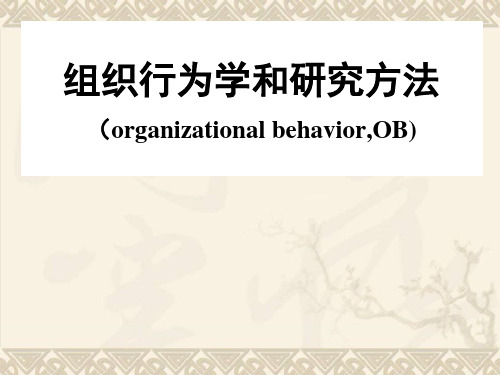
世界100家最 大工业公司 中的位置
3 5 9 1 53
资料来源:赵曙明:《国际企业人力资源管理》P296,1991年7月29日 财富杂志
2020/8/5
13
霍夫斯塔德的文化差异模型
美国学者霍夫斯德(Greet Hotstede)认为,人的个性受到态度、价值观、文 化差异的巨大影响,表现为四个维度:
2020/8/5
14
霍夫斯塔德的文化差异模型
美国 德国 日本 非洲 俄罗斯 中国
2020/8/5
权力 距离
40L 35L 54M
77M 95H 85H
个体 主义
91H
生活 数量
62H
67H 66H
45M 95H
20L 46M
50M 40L 20L 50M
2020/8/5
7
什么是组织行为学(organizational behavior,OB)
组织行为学是研究在组织系统内,个体、群体及结构对 组织内人的行为的影响,以便应用这些知识来改善组 织的有效性。组织行为学是一个研究领域,具有综合 性、应用性的学科特点。
组织行为学研究的重点 组织行为学研究的目的
外国收入 占公司总 收入的%
73.2 58.90 64.70 26.6 54.1 50.00 54.50 40.9
外国净利润 占公司总净 利润的%
97.10 110.30 61.90 69.90 45.10 55.00 68.70 102.10
外国资产占 公司总资产 的%
55.80 48.60 51.10 25.20 44.90 46.20 34.30 28.00
• 组织研究中的权变理论
2020/8/5
11
组织行为学名词解释

组织行为学名词解释组织行为学(Organizational Behavior,简称OB)是研究个体、团队和组织在工作环境中的行为和互动的学科。
它关注员工的行为和决策,以及如何管理这些行为以达成组织的目标。
以下针对组织行为学的一些关键概念进行详细解释。
1. 个体行为个体行为是指在组织中个人展示出的行动和决策。
个体行为的研究关注员工的情绪、动机、个性、态度以及他们与工作的认同度等因素。
这种研究有助于了解员工在组织中的表现和如何激励他们提高绩效。
2. 团队效能团队效能是团队成员有效地协同合作以实现共同目标的程度。
团队效能的高低与团队沟通、决策过程、信任、共享目标和角色明确程度等因素密切相关。
有效的团队效能有助于解决问题、增加创新和提高绩效。
3. 组织文化组织文化是指在组织中共享的信念、价值观、行为规范和工作方式。
组织文化对员工的行为和态度产生影响,它可以塑造组织的身份认同、激励员工的工作态度,并影响组织的绩效和适应性。
4. 领导力领导力是指影响和指导员工实现组织目标的能力。
领导力研究着重于领导者的特质、行为和影响力,以及如何培养和提高领导力。
有效的领导力可以激发员工的创造力、建立高绩效的团队和塑造积极的组织文化。
5. 组织变革组织变革是组织在追求适应环境和实现目标时的重大改变。
组织变革包括战略转变、结构重组、文化改变等。
研究组织变革可以帮助管理者理解变革过程中员工的情感反应、应对挑战并确保变革成功。
6. 动机理论动机理论研究个体为何会产生行为并如何维持行为的动力。
经典的动机理论包括马斯洛的需求层次理论、赫茨伯格的双因素理论和期望理论等。
了解员工的动机可以帮助管理者设计适当的激励措施,提高员工的工作满意度和绩效。
7. 决策过程决策过程是指个体或团队在做出选择时的思考和行动过程。
决策过程可以通过理性决策模型、行为决策模型和政治决策模型来解释。
了解决策过程有助于优化组织中的决策效果,提高组织的绩效和创新能力。
组织行为学简介 organizational behaviour
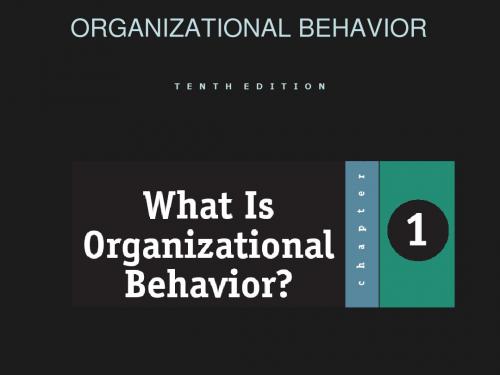
Management Functions (cont’d)
Management Functions (cont’d)
Mintzberg’s Managerial Roles
EXHIBIT
1-1a
Mintzberg’s Managerial Roles (cont’d)
EXHIBIT
1-1b
Mintzberg’s Managerial Roles (cont’d)
7. Explain the need for a contingency approach to the study of OB.
What Managers Do
Managerial Activities • Make decisions • Allocate resources • Direct activities of others to attain goals
4. Networking
• Socializing, politicking, and interacting with others
Allocation of Activities by Time
EXHIBIT
1-2
Enter Organizational Behavior
Contributing Disciplines to the OB Field
5. Identify the contributions made by major behavioral science disciplines to OB.
组织行为学讲义

组织行为学讲义组织行为学复习资料一、组织行为学Organizational behavior (OB) :研究个体、群体和组织结构对组织内行为的影响,其主要目的是利用组织行为学的相关知识来提高组织的效能。
二、组织行为学对组织中出现的行为进行:预测解释控制引导三、系统性研究:是通过观察人们之间的关系、试图定位因果何在并根据科学证据作出结论。
四、对组织行为学相关有贡献的学科:(1)心理学 Psychology 是一门对人和其他动物的行为进行测量和解释,有时还包括对行为进行改变的科学,它关心的是研究和理解个体的行为。
(2)社会学 Sociology 研究的是与其他人发生联系的人。
(3)社会心理学 Social Psychology 心理学和社会学相结合的产物,关注人与人之间的相互影响。
(4)人类学 Anthropology 研究社会以认识人类及其活动。
五、劳动力多元化: 组织正转化成包括不同性别、年龄、种族、民族以及不同性取向的更多元化的混合体。
分类有(性别人种国籍年龄残疾家庭成员宗教信仰)六、权变变量Contingency variables: “It Depends" 环境因素使两变量间的主要关系发生变化:在一定条件下成立的关系在其他条件下未必成立。
七、组织行为学的研究方法:实验室实验法自然实验法现场调查法现场观察法案例研究法。
八、表层多元化——年龄、民族、性别、宗教信仰等方面的不同深层多元化——人格和价值观方面的不同九、年龄:随着年龄增长工作绩效可能会下降劳动力整体呈现老龄化强制退休年龄将不受法律保护年龄越大,离职的可能性就越小。
总的来说,年长的员工比年轻的员工在可避免的缺勤上比率更低,在不可避免的缺勤上,两者比率是一样的。
年龄与工作绩效没什么关系。
年长的员工对工作满意度更高对雇主承诺更高,呈U型关系。
十、性别Gender :在传统男性领域中成功的女性不受人喜欢、具有敌意,作为主管不被欢迎;全职妈妈更喜欢兼职工作、灵活的工作时间、远程办公;女性的缺勤率和离职率更高。
【知识点版】Organizational-behavior-组织行为学
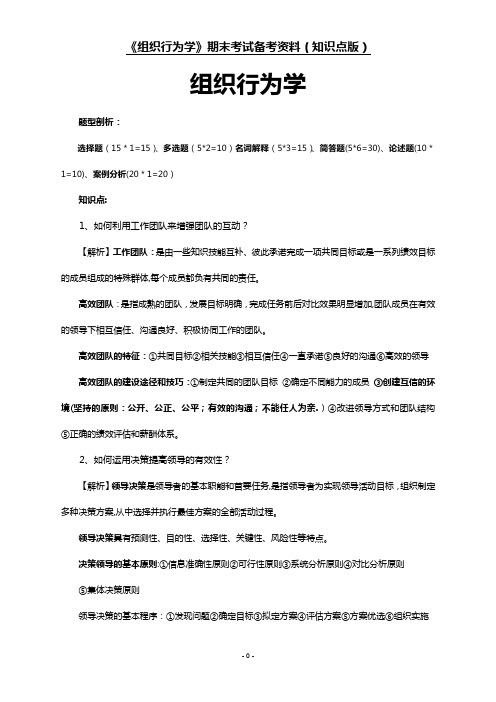
组织行为学题型剖析:选择题(15*1=15)、多选题(5*2=10)名词解释(5*3=15)、简答题(5*6=30)、论述题(10*1=10)、案例分析(20*1=20)知识点:1、如何利用工作团队来增强团队的互动?【解析】工作团队:是由一些知识技能互补、彼此承诺完成一项共同目标或是一系列绩效目标的成员组成的特殊群体,每个成员都负有共同的责任。
高效团队:是指成熟的团队,发展目标明确,完成任务前后对比效果明显增加,团队成员在有效的领导下相互信任、沟通良好、积极协同工作的团队。
高效团队的特征:①共同目标②相关技能③相互信任④一直承诺⑤良好的沟通⑥高效的领导高效团队的建设途径和技巧:①制定共同的团队目标②确定不同能力的成员③创建互信的环境(坚持的原则:公开、公正、公平;有效的沟通;不能任人为亲.)④改进领导方式和团队结构⑤正确的绩效评估和薪酬体系。
2、如何运用决策提高领导的有效性?【解析】领导决策是领导者的基本职能和首要任务,是指领导者为实现领导活动目标,组织制定多种决策方案,从中选择并执行最佳方案的全部活动过程。
领导决策具有预测性、目的性、选择性、关键性、风险性等特点。
决策领导的基本原则:①信息准确性原则②可行性原则③系统分析原则④对比分析原则⑤集体决策原则领导决策的基本程序:①发现问题②确定目标③拟定方案④评估方案⑤方案优选⑥组织实施⑦追踪反馈群体决策的方法:①头脑风暴法②德尔菲法③案例提前分析法④提喻法决策的民主化的条件和途径:领导者要具备民主作风和素质、建立起决策参与民主机制、实现决策制定程序和执行程序民主化、建立决策监督机制接受群众监督决策.3、组织设计应遵循的原则?【解析】原则:①专业化分工原则②统一指挥原则③控制幅度原则④权责对等原则⑤柔性经济原则4、内聚力的定义,作用,影响因素?【解析】定义:群体凝聚力又称群体内聚力,它是群体成员施加各种影响,使之在群体内积极活动和拒绝离开群体的全部力量的总和,是群体对个体的吸引力作用:①内聚力和工作绩效的关系②内聚力与员工满意度的关系③内聚力与员工个人的成长1、如果群体目标与组织大目标一致,且群体成员对组织大目标持支持态度时,凝聚力高的群体比凝聚力低的群体更为有效。
OrganizationalBehavior组织行为学

绩效评估的方法与技巧
关键绩效指标(KPI)
360度反馈
目标管理
平衡计分卡
通过设定一系列的关键绩效指 标来评估员工的工作表现,这 些指标应该与组织的战略目标 相一致,能够反映员工的核心 职责和工作重点。
通过上级、同事、下级等多个 角度对员工的工作表现进行评 估,以获得更全面、客观的反 馈信息。同时,这种评估方式 还能够促进员工之间的沟通和 协作。
冲突的来源与类型
冲突来源
冲突通常来源于资源分配、目标不一致、角 色模糊、个人价值观和利益冲突等方面。这 些因素可能导致组织成员之间产生矛盾和分 歧,影响组织的稳定和发展。
冲突类型
根据不同的分类标准,冲突可以分为多种类 型,如按照性质可以分为建设性冲突和破坏 性冲突;按照表现形式可以分为认知冲突和 情绪冲突;按照涉及范围可以分为个人冲突 和群体冲突等。了解不同类型的冲突有助于 采取不同的应对策略。
和变革精神。然而,这种领导风格对领导者本身的要求很高,需要具备
很高的能力和素质。
05 员工激励与绩效管理
员工激励理论
马斯洛需求层次理论
该理论将人的需求分为五个层次,从低到高分别是生理需求、安全需求、社交需求、尊重需求和自我实现需求。组织 可以根据员工的需求层次给予相应的激励措施,以满足员工的需求,提高其工作积极性和满意度。
组织沟通的原理与技巧
组织沟通原理
组织沟通是组织成员之间传递信息、交流思想和情感的过程,是实现组织目标的重要手段。有效的组织沟通可以 提高组织的效率和绩效,增强组织的凝聚力。
组织沟通技巧
为了实现有效的组织沟通,需要掌握一些沟通技巧,包括积极倾听、清晰表达、非语言沟通、反馈和提问等。这 些技巧可以帮助组织成员更好地理解彼此,减少误解和冲突。
组织行为学英文 Organizational Behavior (Lussier)

Kelley’s Attribution Model
Distinctiveness – is performance highly distinctive relative to other tasks? Consensus – is performance highly similar (in consensus) to other people’s performance? Consistency – is performance highly consistent over time? The answers to these questions will lead to an internal or an external performance attribution.
Organizational Behavior
Definition: the study of actions OF PEOPLE at work that affect performance in the workplace. Goal? To explain and predict behavior Behaviors/Outcomes of concern? Both cognitive and affective
II. a. Models of Attribution
Your book – Attribution is the process of determining the reason for behavior. Kelley’s model is useful for explaining causes/reasons for other’s behavior or performance. Weiner’s model is useful for explaining causes/reasons for our own behavior or performance.
组织行为学英文参考文献
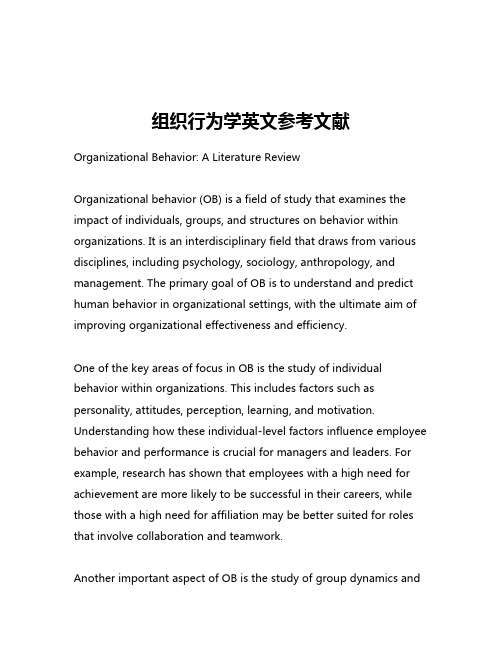
组织行为学英文参考文献Organizational Behavior: A Literature ReviewOrganizational behavior (OB) is a field of study that examines the impact of individuals, groups, and structures on behavior within organizations. It is an interdisciplinary field that draws from various disciplines, including psychology, sociology, anthropology, and management. The primary goal of OB is to understand and predict human behavior in organizational settings, with the ultimate aim of improving organizational effectiveness and efficiency.One of the key areas of focus in OB is the study of individual behavior within organizations. This includes factors such as personality, attitudes, perception, learning, and motivation. Understanding how these individual-level factors influence employee behavior and performance is crucial for managers and leaders. For example, research has shown that employees with a high need for achievement are more likely to be successful in their careers, while those with a high need for affiliation may be better suited for roles that involve collaboration and teamwork.Another important aspect of OB is the study of group dynamics andteam behavior. This includes examining how factors such as group size, cohesion, and leadership influence the way groups function and perform. Effective teamwork and collaboration are essential for organizational success, and OB research has provided valuable insights into how to foster these qualities. For instance, studies have shown that teams with clear goals, well-defined roles, and open communication tend to be more effective than those without these characteristics.Organizational structure and design are also key areas of focus in OB. This includes understanding how different organizational structures (e.g., hierarchical, matrix, or network) and processes (e.g., decision-making, communication, and control) impact employee behavior and organizational outcomes. Effective organizational design can help to align the organization's structure and processes with its strategic goals and the needs of its employees.Another important area of OB is the study of organizational culture and its impact on employee behavior and performance. Organizational culture refers to the shared values, beliefs, and assumptions that guide the behavior of individuals within an organization. A strong, positive organizational culture can foster employee engagement, commitment, and job satisfaction, while a dysfunctional culture can lead to a variety of negative outcomes, such as high turnover, poor communication, and decreasedproductivity.OB research has also examined the role of leadership in shaping organizational behavior. Effective leadership is essential for organizational success, and OB research has provided valuable insights into the characteristics and behaviors of effective leaders. For example, research has shown that transformational leaders, who inspire and motivate their followers, tend to be more effective than transactional leaders, who focus on contingent rewards and punishments.In addition to these core areas, OB research has also explored a variety of other topics, such as organizational change and development, organizational politics and power, and the impact of technology on organizational behavior. As the business environment continues to evolve, the field of OB will need to adapt and expand to address new challenges and opportunities.Overall, the field of organizational behavior is a rich and dynamic area of study that has made significant contributions to our understanding of human behavior in organizational settings. By applying the principles and findings of OB research, organizations can improve their effectiveness, enhance employee well-being, and ultimately achieve their strategic goals.。
《组织行为学》 (OB, Organizational Behavior ) 课件
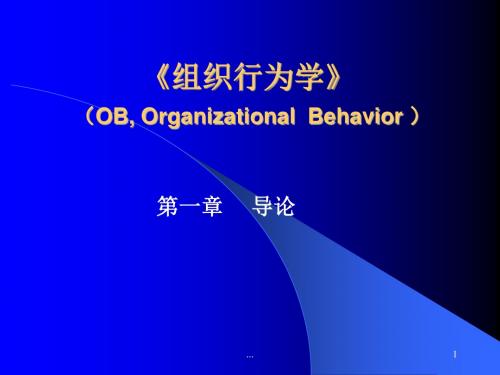
(二)人性的假设
对人的本质不同的认识,必然导致采取 不同的管理指导思想和采取不同的管理 模式。西方管理学、心理学中对人性提 出了各种理论,称为人性的假设。
...
19
1.“经济人”假设
(1) 什么是“经济人”假设: 经济人(rational-economic man )又称为实利人 或金钱人。出于享乐主义的哲学观点,起源于英 国经济学家亚当 . 斯密关于劳动交换的经济理论。 认为人的一切行为都是为了最大限度的满足自己 的私利。人都要争取最大的经济利益,工作是为 了获得经济报酬。人就是为了挣钱才干活。 泰勒称之为经济人,他认为资本家是为了获取最 大利益才开设工厂,而工人则为了获得经济报酬 来工作,只有劳资双方共同努力,大家都可得到好 处。泰勒曾把这种管理称为一次心理上的革命。
...
10
3.根据上述指标,可以了解:
是否贯彻以人为中心的管理思想和管理措施; 指标的高低,不决定于物质与工作条件,而是物质与 精神激励有无成效; 成功的单位各项指标中精神与物质是交叉排列的; 可以作为成功与否的诊断指标、单位努力的方向。
...
11
第一节
学科背景
一、管理概念的拓展
... 9
企业成败与职工的心理评价
1.人的因素是最稳定的因素; 2.心理评价指标: 方向感:职工明确地意识到本单位的发展方向,寄希望于它的发 展; 信任感:职工与领导相互信任,职工以主人翁的姿态; 成就感:领导 认识到单位的成就都与职工个人的成就有关; 职工 意识到自己工作的价值; 温暖感:职工的归属感,为职工排忧解难,人际关系和谐; 舒适感:对工作环境、条件感到比较舒适,有安全感; 实惠感:解决职工的切身利益,物质利益、热爱专业、安于职守;
Organization_Behavior组织行为学
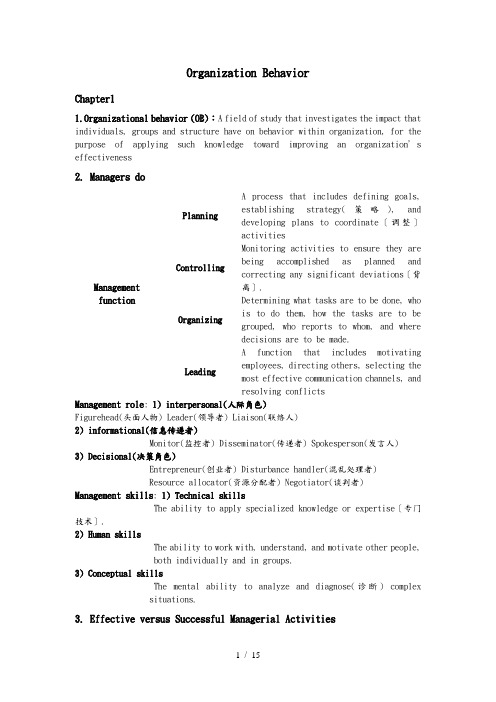
Organization BehaviorChapter1anizational behavior (OB):A field of study that investigates the impact that individuals, groups and structure have on behavior within organization, for the purpose of applying such knowledge toward improving an organization’s effectiveness2. Managers doManagement functionPlanningA process that includes defining goals,establishing strategy(策略), anddeveloping plans to coordinate〔调整〕activitiesControllingMonitoring activities to ensure they arebeing accomplished as planned andcorrecting any significant deviations〔背离〕.OrganizingDetermining what tasks are to be done, whois to do them, how the tasks are to begrouped, who reports to whom, and wheredecisions are to be made.LeadingA function that includes motivatingemployees, directing others, selecting themost effective communication channels, andresolving conflictsManagement role: 1) interpersonal(人际角色)Figurehead(头面人物) Leader(领导者) Liaison(联络人)2) informational(信息传递者)Monitor(监控者) Disseminator(传递者) Spokesperson(发言人)3) Decisional(决策角色)Entrepreneur(创业者) Disturbance handler(混乱处理者)Resource allocator(资源分配者) Negotiator(谈判者) Management skills: 1) Technical skillsThe ability to apply specialized knowledge or expertise〔专门技术〕.2) Human skillsThe ability to work with, understand, and motivate other people, both individually and in groups.3) Conceptual skillsThe mental ability to analyze and diagnose(诊断) complex situations.3. Effective versus Successful Managerial Activities1) Traditional managementDecision making, planning, and controlling2) CommunicationExchanging routine(例行的) information and processing paperwork3) Human resource managementMotivating, disciplining, managing conflict, staffing(人员指挥), and training 4) NetworkingSocializing, politicking(政治活动), and interacting(相互影响) with others4. Challenges and Opportunities for OB1) Responding to GlobalizationIncreased foreign assignmentsWorking with people from different culturesOverseeing movement of jobs to countries with low-cost labor2) Managing Workforce Diversity(差异,多样性)Embracing diversityChanging demographics〔人口〕Implications for managersRecognizing and responding to differences3) Improving Quality and ProductivityQuality management (QM)Process reengineering4) Responding to the Labor ShortageChanging work force demographicsFewer skilled laborersEarly retirements and older workers5) Improving Customer ServiceIncreased expectation of service qualityCustomer-responsive cultures6) Improving People Skills7) Empowering(授权) People8) Stimulating(刺激) Innovation(改革) and Change9) Coping with “Temporariness(临时性)〞10) Working in Networked Organizations11) Helping Employees Balance Work/Life Conflicts12) Improving Ethical(伦理的) Behavior5. Independent and dependent variables2) Independent variable1) individual-level variables个体水平变量人们带着不同的特点进入组织,这些特点将影响到他们在工作中的行为。
Organizational Behavior01
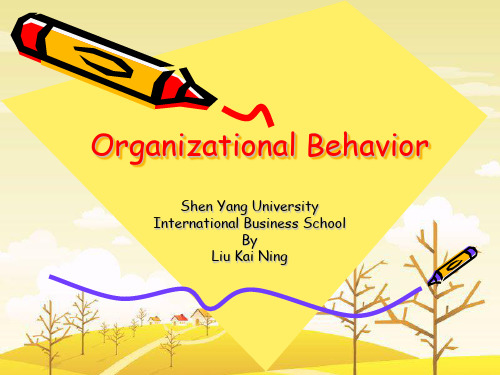
4
5
The Context of Organizational Behavior
Chapter Overview
• An Introduction to OB • Historical BackgrounБайду номын сангаас: Important contributions • Organizational culture
Organizational Behavior
2
Administration
Mon: 8:00 pm – 9:40 pm Thur: 15:10 pm – 16:50 pm
Break Time: 10 minutes
Mobiles/blackberries off!
Organizational Behavior
Organizational Behavior
6
Organizational Behavior
7
Assessment method
1
2 3 Class participation: 10% Practical training (Presentation) : 10% Presentation :10% Mid-term exam: 10% Closed book exam: 60%
Organizational Behavior
14
Understanding organizational behavior contd.
• Organizations have been reengineered for greater speed, efficiency, and flexibility. • OB is not an everyday job category such as accounting, marketing, or finance. • OB is a horizontal discipline that cuts across virtually every job category, business function, and professional specialty. • Those who plan to make a living in any organization need to study OB, whether or not they will be managers.
组织行为学英文organizational behavior
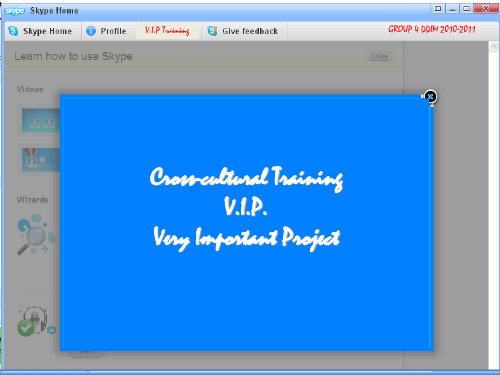
WE ARE DIFFERENT: CULTURE BACKGROUND
oHofstede’s five o dimensions oHall’s context of culture oFour-fold model
often verbal communication..
Don't simply rely on emails to give information.
Here you find the resuultssoef fHuolfstede‘tso The useof emotion in communication should be seen as a sign of enthusiasm and emphasis rather than as anger or loss of control.
New is good. Change is ever present in American corporate life and therefore so is the easy acceptance of new ideas, new models etc.
WE ARE DIFFERENT: CULTURE BACKGROUND
two months.
A full commitment is required by all of you in order to successfully learn how to exploit the huge potential of multicultural teams and how, at the same time, avoid the traps
mChapter 1 - Organizational Behavior
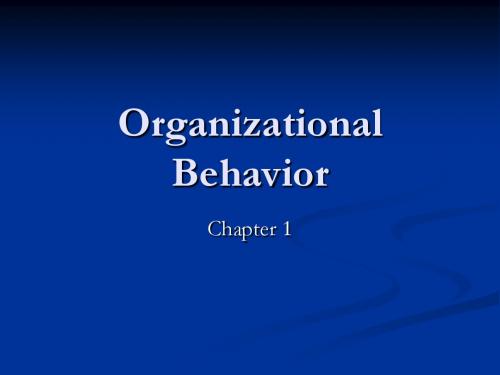
Challenges for OB
Understanding OB is very important for managers. Changes taking place in organizations supports the reason why managers need to know about OB: Employees getting older More diversity in the workforce/cultures Downsizing/economic changes Global competition/foreign assignments Rapid changes in environment/competition/technology
Decisional
Entrepreneur – searches organization and its environment for opportunities and initiates projects to bring about change Disturbance handler – responsible for corrective action when organization faces important unexpected disturbances Resource allocator – makes or approves significant organizational decisions Negotiator – responsible for representing the organization at major negotiations
Get things done through other people Make decisions, allocate resources and direct the activities of others to reach goals.
课件OrganizationalBehavior组织行为学
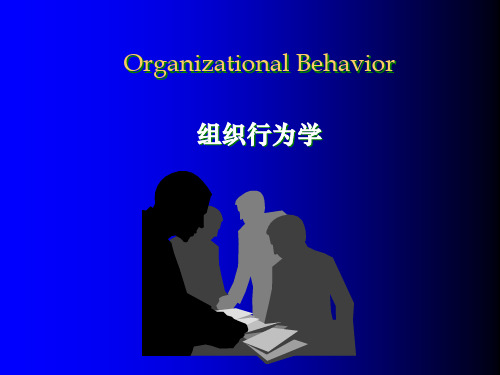
整理版ppt课件
4
Method of Assessment 考评方法
▪ Individual Paper ▪ Case Study ▪ Job Satisfaction Survey ▪ Presentation ▪ Final Exam
整理版ppt课件
20% 20% 20% 10% 30%
5
第一章 绪论
整理版ppt课件
15
Organizational Behavior
▪ 行为是指生命体由内在心理支配和外在目标驱使而形成的行 动和作为。
▪ 组织行为是指组织的内部要素的相互作用以及组织外部环境 的相互作用过程中所形成的行动和作为。
▪ 组织行为学探讨个体、群体以及结构对组织内部行为的影响, 以便提高组织的有效性。
12
组织 1. 在追求目标中工作的个体:
组织 2. 相互影响的小组,群体和部门:
组织 3. 整个组整织理版ppt课件
组
织
形
成
的
图
13
组织表象(外在的)
目标 技术
结构
财政来源
技巧和能力
行为方面(潜在的
沟通模式
组
态度
织
ห้องสมุดไป่ตู้
群体作用
冰
冲突
山
图
解决整问理题版pp的t课方件 式
14
OB对管理者的帮助
1. 有助于提高管理者的人际技能; 2. 提高企业人力资源管理的有效性; 3. 认识组织冰山潜层的问题; 4. 成为一个有效的管理者
整理版ppt课件
技能观 1. 技术技能 2. 人际技能 3. 概念技能
10
Managerial Activities
- 1、下载文档前请自行甄别文档内容的完整性,平台不提供额外的编辑、内容补充、找答案等附加服务。
- 2、"仅部分预览"的文档,不可在线预览部分如存在完整性等问题,可反馈申请退款(可完整预览的文档不适用该条件!)。
- 3、如文档侵犯您的权益,请联系客服反馈,我们会尽快为您处理(人工客服工作时间:9:00-18:30)。
Overview of Expectancy Theory
Effort
Performance
Reward
Expectancy
X Instrumentality X
Valence of reward
Abilities and traits
Steelcase Delta Airlines
SAS Company???
Reward
Stock purchase options Partial ownership in the company Opportunity to help train new employees Free meals while on the job Haircuts for $2 while at work Fridays off during the month of May Courses in real estate, golf, painting, photography,
INEQUITABLE RELATIONSHIP
Bill is underpaid compared to Andy
Bill’s outcomes ($25,000/year) Bill’s inputs (40 hours/week)
Andy feels guilty
Andy is equitably paid compared to Bill
Equity Theory (cont’d)
Propositions relating to inequitable pay: 1. Overrewarded employees produce more
than equitably rewarded employees. 2. Overrewarded employees produce less, but
was set
1 2 3 4 5 6 7 8 9 10 11 12
Before goal After Goal
Four-Week Periods
Seven Years Later
ERG Theory (Clayton Alderfer)
Core Needs
Existence: provision of basic material requirements.
Lower-order needs
Need Hierarchy Theory
Selfactualization
needs Esteem needs Social needs Safety needs Physiological needs
Two-Factor Theory (Frederick Herzberg)
Going “Beyond the Fringe” in Benefits: Especially Creative Reward Practices
Company
Apple Computer Publix Super Markets Advanta Corporation Westin Hotels Worthington Industries Reader’s Digest Pitney Bowes
and cake decorating Access to camping facilities and equipment Free airline travel for employees and spouses
Theory X and Theory Y (Douglas McGregor)
Higher-order needs
do higher quality piece work. 3. Underrewarded hourly employees produce
lower quality work. 4. Underrewarded employees produce larger
quantities of lower-quality piece work than equitably rewarded employees
ORGANIZATIONAL BEHAVIOR
LEARNING OBJECTIVES
After studying chapter six and listening
to my lecture, you should be
able to:
1. Outline the motivation
process.
Factors characterizing events on the job that led to extreme job dissatisfaction
Factors characterizing events on the job that led to extreme job satisfaction
2. Describe Maslow’s need hierarchy.
3. Contrast Theory X and
Theory Y.
4. Differentiate motivators from hygiene factors.
5. List the characteristics
that high achievers prefer in a job.
Equity Theory
Referent Comparisons: Self-inside Self-outside Other-inside Other-outside
7
Equity Theory (cont’d)
Choices for dealing with inequity: 1. Change inputs (slack off) 2. Change outcomes (increase output) 3. Distort/change perceptions of self 4. Distort/change perceptions of others 5. Choose a different referent person 6. Leave the field (quit the job)
David McClelland’s Theory of Needs
nPow
nAch
nAff
Matching Achievers and Jobs
Cognitive Evaluation Theory
Reinforcement Theory
Concepts: Behavior is environmentally caused. Behavior can be modified (reinforced) by providing (controlling) consequences. Reinforced behavior tends to be repeated.
MOTIVATION
JOB PERFORMANCE
Role perceptions and opportunities
Equity Theory: A Summary and Example
Andy is overpaid compared to Bill
Andy’s outcomes ($30,000/year) Andy’s inputs (40 hour/week)
6. Summarize the types of
goals that increase performance.
Defining Motivation
Key Elements 1. Intensity: how hard a person tries 2. Direction: toward beneficial goal 3. Persistence: how long a person tries
EQUITABLE RELATIONSHIP
Bill feels angry
Bill is equitably paid compared to Andy
Andy’s outcomes ($30,000/year) Andy’s inputs Andy feels (40 hour/week) satisfied
Flow and Intrinsic Motivation Theory
Ken Thomas’s Model of Intrinsic Motivation
➢ Employees are intrinsically motivated when rewards an employee gets from work result from:
Relatedness: desire for relationships.
Growth: desire for personal development.
Concepts:
More than one need can be operative at the same time.
If a higher-level need cannot be fulfilled, the desire to satisfy a lowerlevel need increases.
– Choice– the ability to freely self-select and perform task activities.
– Competence– the sense of accomplishment from skillfully performing chosen tasks or activities.
Goal Setting: Some Impressive Effects
